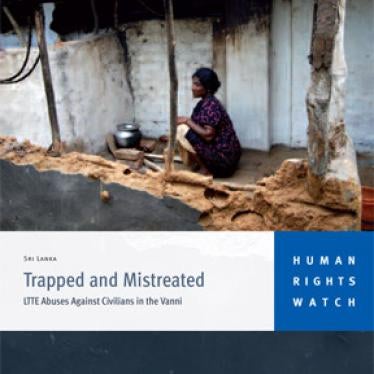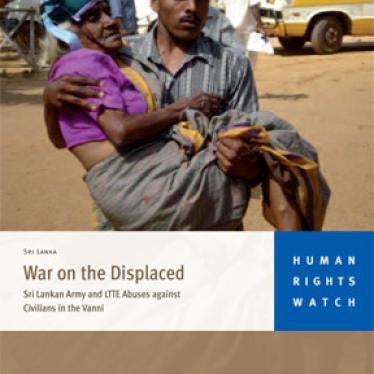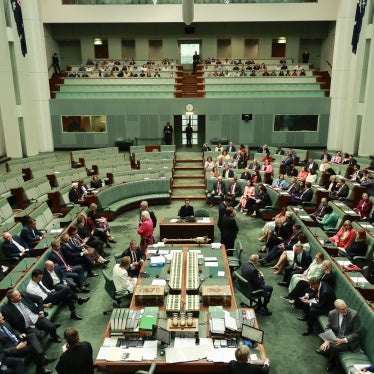I met Neelan Tiruchelvam, a prominent activist who had entered Sri Lankan politics, on my first trip to the island nation 15 years ago. Over several cups of tea he patiently explained the complexities and risks for ethnic Tamils who were critical of both the government and the separatist Liberation Tigers of Tamil Eelam. He believed that as a member of parliament, he could help bring peace to the country, mired in a brutal civil war since the mid-1980s. In 1999, a Tiger suicide bomber blew him up outside his Colombo home.
Peace may finally have come to Sri Lanka. This week government forces defeated the remaining Tamil Tiger forces in their northeastern stronghold. Ruthless to the end, the Tigers had forced the Tamil population under their control to join them every step of the way in their long retreat. Tiger forces used the very people they claimed to be fighting for as human shields, and shot at those desperately trying to flee the fighting.
The government has reported the deaths of the Tamil Tigers’ leader, the ruthless and reclusive Velupillai Prabhakaran, and his lieutenants, though the circumstances remain unclear. Despite their defeat on the battlefield, the Tigers may survive underground, doing what they do best — attacking civilians.
The Tigers were the first armed group to make suicide bombing their trademark. They assassinated numerous political leaders, including India’s former prime minister Rajiv Gandhi and hundreds of Tamil politicians, journalists, activists, academics and others deemed to be a threat. They engaged in wholesale acts of cold-blooded slaughter, such as the execution of several hundred Sinhalese and Muslim police officers in 1990 and the repeated bombings of crowded buses.
But the Tamil Tigers were never about nihilistic violence. They had a clear agenda: to create a Tamil state, “Tamil Eelam.” Their selling point was their claim that they were the “sole representative” of Sri Lanka’s Tamils. This guiding principle had been the group’s greatest strength and weakness.
Since the LTTE’s founding in 1976, the Tigers co-opted or crushed nearly all of the Tamil political groups that had emerged to protect Tamil rights in the face of discrimination and violence by Sri Lanka’s Sinhalese majority. As a result, only a handful of Tamil political factions opposed to the Tigers remain. Many in the Tamil diaspora, largely families who fled government abuses, have unquestionably supported the Tigers, viewing them as the only viable bulwark against further state repression.
But the Tigers’ totalitarian mind-set was also their undoing. Their use of Tamil children in military operations — including as suicide bombers — the mafia-like fund-raising tactics in Canada and Britain and their oppressive rule in the areas they controlled generated disgust among many Tamils within Sri Lanka and abroad. It also opened the door to a human rights-conscious Tamil opposition that can play a leading role in Sri Lanka’s future.
Unfortunately, the government of President Mahinda Rajapaksa treated the Tigers’ atrocities as a license for its own abuses. Instead of taking the high ground — morally, politically, and militarily — Rajapaksa used the war to solidify his support among ultra-nationalist Sinhalese. The government appears to view all Tamils as presumptive Tiger supporters and has locked up in camps all who have fled the fighting but the elderly — now some 300,000 people. Sri Lankan army forces indiscriminately shelled and starved the Tamil civilians trapped by the Tigers, causing several thousand civilian deaths and massive suffering. And in its plans for the future, the administration has favored Tamil leaders with poor rights records and given short shrift to the Tamil population’s legitimate political concerns.
There are immediate concerns: caring for the wounded on the battlefield, ending unlawful restrictions on civilians who fled the fighting, and respecting the rights of captured combatants. For the longer term, the government needs to adopt a broad agenda designed to unite the war-torn nation in peace. This means an impartial investigation into abuses by all parties to the conflict. It entails revoking laws and state policies that have discriminated against the Tamil population. And it obliges the government undertake serious and broad consultations with Tamils and other minority groups on the country’s political future.
President Rajapaksa needs to realize that winning the war, no matter how important, is not the same as achieving peace. Alienating Tamil society will merely push the country’s problems down the road for the future. If that’s the case, the peace and justice that Neelan Tiruchelvam sought — and died for — will continue to elude the Sri Lankan people.
James Ross is the legal and policy director at Human Rights Watch.









